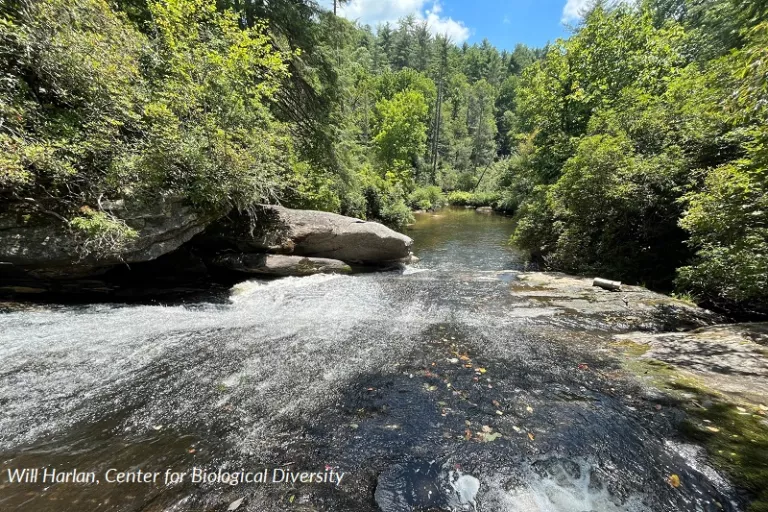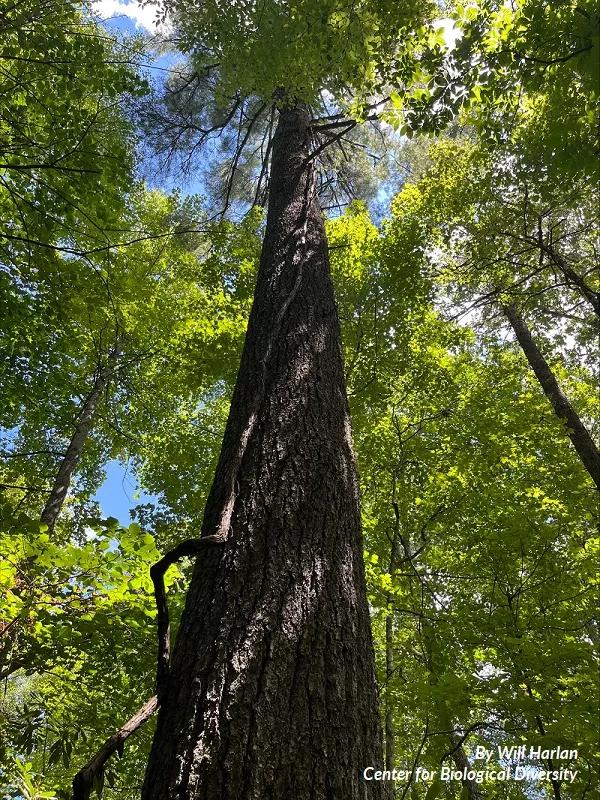A designated "special interest area" in the Nantahala National Forest will be spared from logging under a settlement between the U.S. Forest Service and environmental groups including the Sierra Club.
That's the latest in what's been a busy six months for our work to protect sensitive environments and unique natural areas in North Carolina's western mountains, as we continue to fight to fix flaws in the USFS's management plan for the Pisgah and Nantahala national forests.
The N.C. Sierra Club spent over a decade working with other stakeholders to safeguard the Pisgah and Nantahala as the management plan was drafted. Despite all that work, the final plan released in February 2023 was a major disappointment, with logging and road building plans that presented numerous threats to wildlife, habitat, old growth and more.
For the Chapter and our allies, the plan still isn't a done deal. We're continuing to fight point by point to address the flaws. Read on for a recap of what's happened this year.
Our lawsuit pushes USFS to amend Southside project
The Southern Environmental Law Center, on behalf of the Sierra Club and our allies, sued the USFS in January over the Southside Timber Project, which aimed to log areas near the Whitewater River, a section of the Nantahala NF that features stunning waterfalls, towering oak trees, and critical habitat for rare species.

The USFS and State of North Carolina have recognized the area as an exceptional ecological community, with some of the highest biodiversity values in the state. In fact, the USFS designated it as a “Special Interest Area” in its Nantahala-Pisgah Forest Plan released last year – a designation that brings significant restrictions for destructive projects such as logging and roadbuilding. Despite this recognition, the agency decided to push forward with harmful logging in the area.
In late June, USFS announced it would scrap the plans to log the areas we flagged in our January lawsuit, as other parts of the Southside Project continue. In response, SELC dismissed the lawsuit.
"The decision by the Forest Service is the right one, given the recent federal emphasis on old growth protection and the importance of recognizing North Carolina’s Natural Heritage sites," said David Reid, a member of the WNC Group and our volunteer National Forest Issue Chair. "Unfortunately, it took legal action for the agency to make the right decision."
Bat protection lawsuit remains active
Still pending is a lawsuit filed in April to protect habitat for endangered bats. That lawsuit, again filed by SELC on behalf of conservation partners including the Sierra Club, argues that the forest management plan puts the bats at risk by expanding logging into some of the most important and sensitive habitats in the Nantahala and Pisgah national forests.
The lawsuit focuses on the northern long-eared bat, Indiana bat, Virginia big-eared bat, and gray bat, which are on the edge of extinction. The USFS has even acknowledged that the species' survival depends on protecting habitat in the two national forests.
We claim that the USFS violated the federal Endangered Species Act by failing to fully study the impact of the dramatically increased logging, relying on incomplete and inaccurate information, and even ignoring data showing where bats are found on the national forests.
Going to the top to help save old growth
In a broad approach to protect the unique natural beauty, habitat and biodiversity of the Nantahala and Pisgah national forests, we've asked for help from a powerful potential ally: President Biden.
The N.C. Chapter is one of 17 environmental groups that wrote to Biden in May, asking him to "enact the strongest possible protections for mature and old-growth trees and forests on federal lands."

The letter notes that, in addition to the wildlife corridors, recreational appeal and scenic beauty they provide, old-growth "forests and trees are better at absorbing and storing carbon than younger forests and trees and provide benefits such as fostering a diverse ecosystem."
"North Carolina’s forests are a vital part of our natural heritage. We take great pride in our beautiful landscape, including our gorgeous and diverse forests. From the whitewater falls in Nantahala to the mile-high peaks and forested slopes of Pisgah, our national forests are a big part of what makes North Carolina such an amazing place to live and visit," it reads.
The national Sierra Club is working protect old growth and "future old growth" as the USFS drafts changes to all national forest management plans to comply with Biden administration directives to protect old growth. Read more from Sierra Magazine, and join us in speaking up for strong protections!
Thanks to all our members and supporters who have repeatedly spoken up to demand improvements to the Pisgah-Nantahala management plan, to support our legal actions, and to advocate for our mission to "explore, enjoy and protect" these precious public lands. We're strongest when we work together!